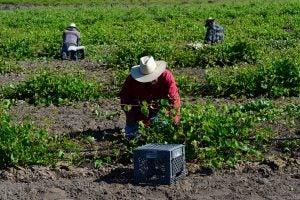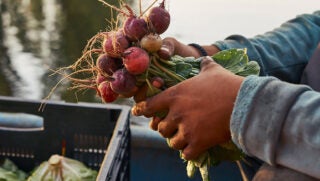When I was younger, I had a very narrow perception of what “agriculture” or “farming” looked like. I imagined a large field in rural middle America, where corn or soybean crops were grown. I imagined the farm to be run by middle-class White Americans, who were maybe third- or fourth-generation farmers.
I never thought about diversity in agriculture, mainly because I never had any indications to change my perception of what I imagined it looked like.
I grew up in a concrete jungle in suburban Southern California and hardly saw any vestiges of food production other than my mother’s wild garden, in which she grew Southeast Asian fruits and vegetables in a haphazard manner. It wasn’t until I attended University of California, Davis, that I was exposed to the world of agriculture. Specifically, I was introduced to the plethora of research that was behind the scenes of agriculture — tons of plant scientists who were trying to improve crop yields and better growers’ lives. Seeing so much research made me realize that agriculture and farming isn’t a static field — there is constant change, new trends emerging, and different ways to farm and grow crops.
Since then, I’ve been interested in agriculture and food systems. Food is a vital aspect for society, and the act of growing food directly ties into the survival of our species. It’s almost wild to think how someone like me could go so long with such a narrow perception of this industry.

After graduating from UC Davis, I took a position as a field aide for Morning Star Trucking, which specializes in hauling tomatoes from the field to the cannery. While conducting research in field trials, I got to see farming and agriculture up close. I met growers, field hands, and business leaders who all helped shape my perception of what agriculture was.
I also got my first exposure to a facet of diversity in agriculture that is not talked about enough — seeing Mexican/Latino immigrants toil in the field.
My role with Morning Star couldn’t be further away from the image I originally had of agriculture, but it was undeniably agriculture and farming. This was the first of many experiences that broadened my horizons. Even though California is a huge agricultural state, supported by a large population of Hispanic workers, the imagery I had of what a farm looked like was not this, but of Midwest America and White farmers.
I felt ashamed and guilty that I had never looked more closely in my own state, at what industries existed, and what the people who worked in them looked like. While my education at UC Davis taught me that there is more in the technical aspect of agriculture, my first job after graduating taught me that there is more in the socio-economic aspect of agriculture as well.
Later in life, while I was attending Pennsylvania State University earning my Masters in Horticulture, I joined a book club where we read Robin Wall Kimmerer’s Braiding Sweetgrass, a book about her journey as a Potawatomi and how she combines her Native American heritage with her career as a plant scientist. Reading her book and discussing its contents with my peers made me realize once again that there was an entire group of people whose legacy in agriculture I hadn’t fully considered.
In her book, Kimmerer speaks about indigenous knowledge of farming and how approaches to growing crops were erased or lost as her people’s culture was eradicated. Hearing her stories again broadened my perception of what agriculture was, and could be, when diverse peoples are allowed to represent this field and share their stories and opinions.
Kimmerer’s work also made me realize the importance of communicating these stories to others, so that the impact of these stories can be spread to more audiences. Since then, my interest in scientific communication has been growing, and I believe strongly in telling stories that are not common, that can broaden the horizons for others as these stories did for me.
The opportunity to partake in this internship is a valued privilege for me, and I am excited at the prospect of not just discovering new stories that will diversify and widen my perception of agriculture, but getting to share them with you, the reader. I look forward to sharing these stories with you, and I hope that they serve to facilitate discussions and engagement in ways that promote the diversification of agriculture.
Liza Thuy Nguyen serves as the 2023 American Farmland Trust Agriculture Communications Intern at AGDAILY, with a focus on helping to amplify diversity and minority voices in agriculture. Liza is originally from Anaheim, California, and attended the University of California, Davis, as a first-generation college student. She received a bachelor’s degree in genetics and genomics and went on to earn a master’s in horticulture from Penn State.




